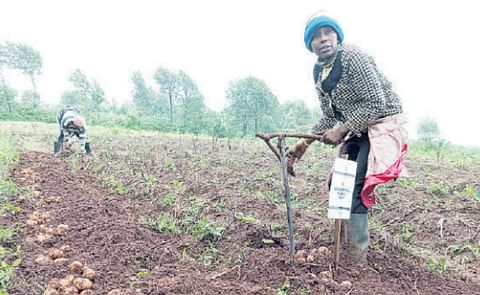The Bangladesh Agricultural Research Institute (Bari) and Peru-based International Potato Centre (CIP) will introduce a late blight resistant potato for use in next season: Bari Potato - 46
Scientists have come up with a potato variety resistant to Late Blight disease, viruses and drought that wreak havoc on potato production every year.
The National Seed Board under the agriculture ministry has already given clearance to Bari Potato-46, developed jointly by Bangladesh Agricultural Research Institute (Bari) and Peru-based International Potato Centre (CIP).
Bari and CIP would introduce the new seeds, the first of its kind in Bangladesh, for use in the next season, arming the farmers to fight Late Blight better. The fungal infection causes farmers to lose 25-57 percent of their yield.
The variety is also likely to help farmers save money they now spend on fungicides. More than 500 tonnes of fungicides are used every season to control Late Blight nationwide.
The Late Blight resistant potato has yield potential of 35-40 tonnes per hectare, which is over 40 percent higher than the popular variety Diamant.
Bangladesh produces more than 80 lakh tonnes of potato a year despite yield losses to Late Blight.
USAID, CIP, The World Vegetable Centre (AVRDC) and Bari yesterday jointly organised a programme to disseminate information on the newly released potato variety at Hotel Sarina, Dhaka. The government also released two verities of beta carotene-rich sweet potatoes, Bari SP-12 and Bari SP-13, to fight vitamin A-deficiency among children.
Mohammad Hossain, sector leader-Potato, USAID Horticulture Project, said, "It [Late Blight resistant potato] is also suitable for processing to make potato chips.
"The variety will give optimum yield in 80 days," he maintained.
Anwar Faruque, director general of Seed Wing under Agriculture Ministry, said, "Potato is now the main cash crop of farmers. Earlier it was jute."
He said the government gives incentives to boost fresh potato exports so that farmers get better prices. Recently, there has been improvements in the exports but the quantity is not that significant compared to overall production, he said.
He suggested that scientists work on introducing varieties that have demand in the global market and which could be processed to make potato chips.
Bangladesh to introduce late blight resistant potato variety

Like to receive news like this by email? Join and Subscribe!
NEW! Join Our BlueSky Channel for regular updates!
Highlighted Company
Potato varieties mentioned
Sponsored Content
Sponsored Content
Sponsored Content
Sponsored Content
Sponsored Content








